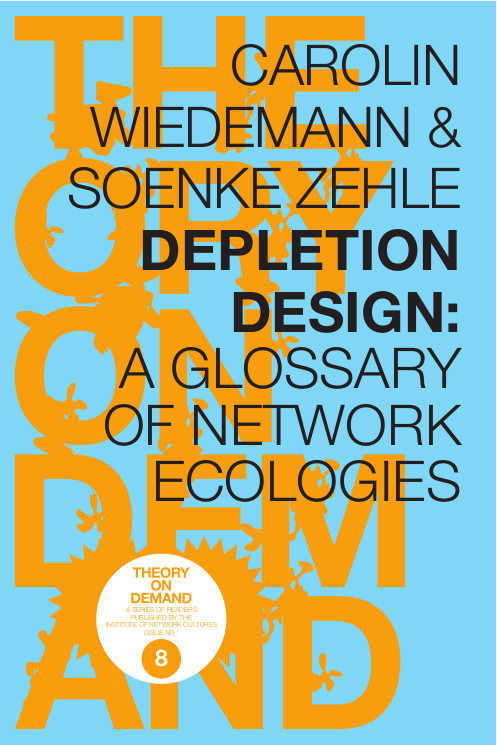Flusser’s View on Art: MECAD Online Seminar (2004)
Filed under booklet | Tags: · art, art theory, media theory, philosophy, philosophy of art, photography, theory
The Vilém Flusser seminar took place in 2004 and was a cooperation between MECAD, Barcelona, and the _Vilém_Flusser_Archive. Presented was a text selection of Flusser’s writings on art. The seminar included also a presentation by Silvia Wagnermaier and a reflection text on Flusser’s theory by Siegfried Zielinski.
Comment (0)Carolin Wiedemann, Soenke Zehle (eds.): Depletion Design: A Glossary of Network Ecologies (2012)
Filed under book | Tags: · algorithm, anonymous, architecture, biopolitics, commons, creative industries, cyborg, design, ecology, hackerspace, media ecology, network ecology, networks, politics, remix, software, spam, technology, theory

“Depletion Design suggests that ideas of exhaustion cut across cultural, environmentalist, and political idioms and offers ways to explore the emergence of new material assemblages. Soenke Zehle and Carolin Wiedemann discuss Depletion Design with Marie-Luise Angerer, Jennifer Gabrys and David M. Berry, inviting tm13 participants into a collaborative reflection on the necessity to understand human beings as one species among others – constituted by interactions of media, organisms, weather patterns, ecosystems, thought patterns, cities, discourses, fashions, populations, brains, markets, dance nights and bacterial exchanges (Angerer); on the material leftovers of electronics as provocations to think through and rework practices of material politics that may be less exploitative within our natural-cultural relationships (Gabrys); and on lines of flight from and through the computational – about expanding them into new ways of living beyond current limitations and towards new means of judgment and politics (Berry).
We, or so we are told, are running out of time, of time to develop alternatives to a new politics of emergency, as constant crisis has exhausted the means of a politics of representation too slow for the state of exception, too ignorant of the distribution of political agency, too focused on the governability of financial architectures. But new forms of individual and collective agency already emerge, as we learn to live, love, work within the horizon of depletion, to ask what it means to sustain ourselves, each other, again. Of these and other knowledges so created, there can no longer be an encyclopedia; a glossary, perhaps.”
Contributors: Marie-Luise Angerer (Cyborg), Franco ‘Bifo’ Berardi (Exhaustion, Soul Work), David M. Berry (On Terminality), Zach Blas (Queer Darkness), Drew S. Burk (Grey Ecology), Gabriella Coleman (Anonymous), Heidi Rae Cooley (Ecologies of Practice), Sebastian Deterding (Playful Technologies, Persuasive Design), Jennifer Gabrys (Natural History, Salvage), Johannes Grenzfurthner & Frank A. Schneider (Hackerspace), Eric Kluitenberg (Sustainable Immobility), Boyan Manchev (Disorganisation, Persistence), Lev Manovich (Software), Sonia Matos (Wicked Problems), Timothy Morton (Ecology without Nature), Jason W. Moore (Crisis), Anna Munster (Digital Embodiment), Eduardo Navas (Remix[ing] Re/Appropriations), Brett Neilson (Fracking), Sebastian Olma (Biopolitics, Creative Industries, Vitalism), Luciana Parisi (Algorithmic Architecture), Jussi Parikka (Dust Matter), Judith Revel (Common), Ned Rossiter (Dirt Research), Sean Smith (Information Bomb), Hito Steyerl (Spam of the Earth)
Publisher Institute of Network Cultures, Amsterdam, Dec 2012
Theory on Demand series, 8
Creative Commons Attribution-NonCommercial-ShareAlike 3.0 Netherlands License
ISBN 9789081857512
via jussiparikka.net
PDF, PDF (updated on 2015-7-9)
Comment (0)Peter Sloterdijk: The Art of Philosophy: Wisdom as a Practice (2010/2012)
Filed under book | Tags: · asceticism, epistemology, phenomenology, philosophy, theory

In his best-selling book You Must Change Your Life, Peter Sloterdijk argued exercise and practice were crucial to the human condition. In The Art of Philosophy, he extends this critique to academic science and scholarship, casting the training processes of academic study as key to the production of sophisticated thought. Infused with humor and provocative insight, The Art of Philosophy further integrates philosophy and human existence, richly detailing the foundations of this relationship and its transformative role in making the postmodern self.
Sloterdijk begins with Plato’s description of Socrates, whose internal monologues were so absorbing they often rooted the philosopher in place. The original academy, Sloterdijk argues, taught scholars to lose themselves in thought, and today’s universities continue this tradition by offering scope for Plato’s “accommodations for absences.” By training scholars to practice thinking as an occupation transcending daily time and space, universities create the environment in which thought makes wisdom possible. Traversing the history of asceticism, the concept of suspended animation, and the theory of the neutral observer, Sloterdijk traces the evolution of philosophical practice from ancient times to today, showing how scholars can remain true to the tradition of “the examined life” even when the temporal dimension no longer corresponds to the eternal. Building on the work of Husserl, Heidegger, Nietzsche, Arendt, and other practitioners of the life of theory, Sloterdijk launches a posthumanist defense of philosophical inquiry and its everyday, therapeutic value.
Originally published as Scheintod im Denken, Suhrkamp Verlag, Berlin, 2010
Translated by Karen Margolis
Publisher Columbia University Press, New York, 2012
ISBN 0231158718, 9780231158718
107 pages
PDF (EPUB)
Comment (1)
